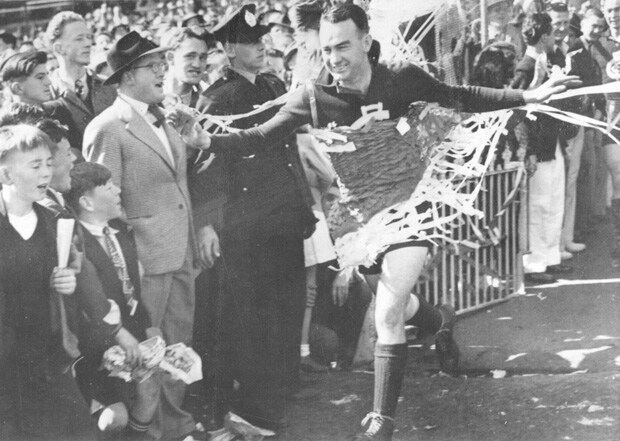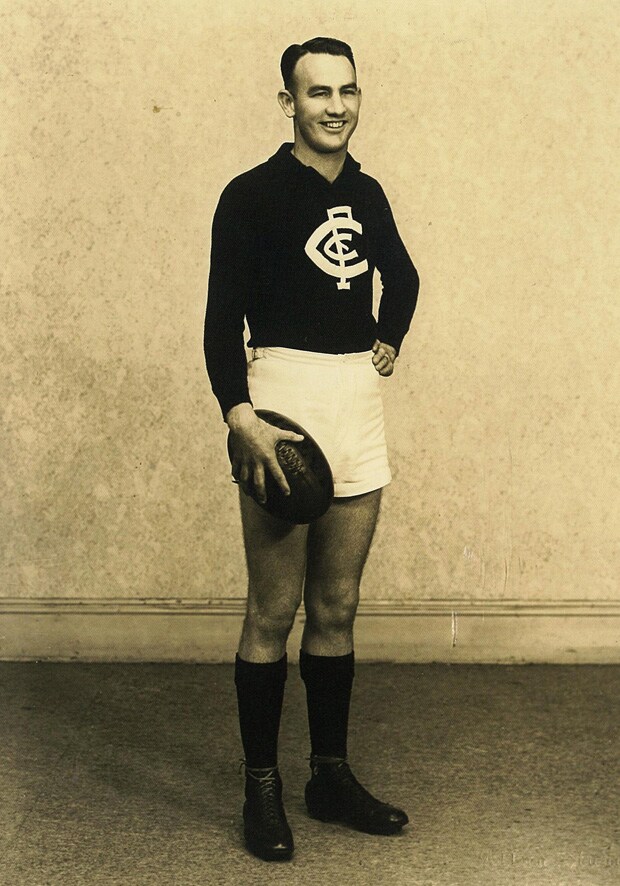On the afternoon of Saturday, August 26, 1944, just hours after Paris was liberated and Charles De Gaulle led the triumphant march down the Champs-Élysées, Carlton captain Bob Atkinson led his players off the field and into the winners’ circle at Princes Park.
There, the Carltonites belted out a lively rendition of Lily of Laguna, having just inflicted a 106-point thumping of Geelong with a record score set against that club of 23.28 (166).
Heroes of the piece in that 17th round were Alex Way (one of only two surviving members of “The Bloodbath” Grand Final of 1945) booting a lazy five goals, and “Mick” Price and Charlie McInnes (who also survived the ’45 “Bashball” GF) each kicking four.
The match is remembered for the 100th senior appearance of Brock McLean’s “Pop”, Rod McLean, and the last hurrah of football’s oldest surviving player Mac Wilson, who recently turned 100.
But it is also remembered for the senior debut of one of the truly great footballers in Carlton history - the 1947 Premiership Captain Ern Henfry – 70 years ago this week.

Ern Henfry runs through the banner before the 1947 Grand Final. (Photo: Carlton Football Club)
By the time he first ran out for Carlton, Henfry’s reputation had preceded him. An outstanding junior in his home state of Western Australia, Henfry was just 17 when he got the call up in 1939 to represent his state against the Big V.
Two years later, he took out Perth Football Club’s Best & Fairest, and ‘finished runner-up to Haydn Bunton in the Sandover Medal.
But by season’s end, he had joined the thousands in enlisting for wartime duty.
Then in 1944, while on leave from the RAAF in Melbourne, Henfry committed to two games for Carlton on permit – the aforementioned fixture with Geelong and the 18th round match with Footscray at Princes Park. In both instances, Henfry stunned the club’s astute football judges with his rare ability, wearing the No.5 now worn by the great Chris Judd.
Standing 182cms and tipping the scales at 82kg, Henfry was big for a centreman, but his sublime skills, genuine pace and evasiveness made him a rare commodity.
When the War ended in 1945, and Henfry returned to his pre-war job as a bank officer, an influential Carlton supporter (bless him!) arranged for the player’s transfer to Melbourne. The club then sought a clearance from Perth, but were duly refused and Henfry was forced to sit out the entire 1946 season.
Then, early in 1947, Carlton dropped a bombshell by naming Henfry, with just two games to his name, as captain for that year. As would be the case with Stephen Kernahan years later, this was an inspired call by Coach Bentley and his match committee and when the Blues successfully lobbied the ANFC against Perth’s refusal to clear him, Henfry was theirs.
Henfry’s canny reaped immediate reward, and the team won its way to the ’47 Grand Final against Essendon. The match pitted Henfry with Dick Reynolds, and the former more than held his own before gaining the crucial ascendancy late. Fred Stafford is rightly considered the hero of the piece with his match-winning goal in the dying seconds of the contest, but Henfry’s contribution was seismic.
Henfry’s dream ’47 season ended with his awarding of the Robert Reynolds Trophy in a tie with Bert Deacon, who also won the ’47 Brownlow. Henfry would again take out the Robert Reynolds in ’49, the same year he led his team to the Grand Final.

Carlton Hall of Famer Ern Henfry. (Photo: Carlton Football Club)
Henfry fulfilled his duties as Carlton captain until 1952, when knee and ankle injuries forced him into retirement at 31. He had featured in just 84 games for the dark Navy Blues, but is forever remembered amongst the true champions of the only team old Carlton knows.
The inhospitable Victoria Park would serve as the backdrop for Henfry’s last hurrah for Carlton, against Collingwood in the 17th round of 1952. The good guys sent Ern out with a 21-point win, on an afternoon in which the mercurial Keith Warburton slotted a lazy six.
Towards the end of ’52, Henfry returned to his native Western Australia. Forty years later, he was inducted into the Carlton Football Club Hall of Fame.
Then in June of this year, some seven years after his passing, Henfry was posthumously inducted into the AFL Hall of Fame.


